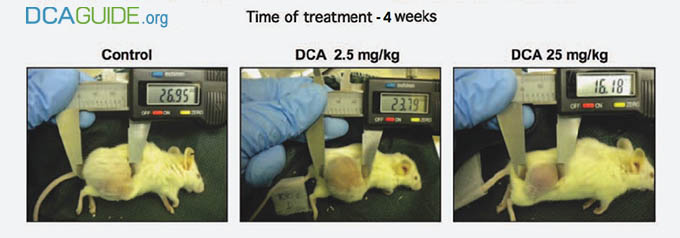Recently, substantial evidence from experiments in vitro as well as experiments in vivo models has shown that DCA can be useful in treating various types of cancer in humans. This was later on confirmed by clinical trials as well as numerous real life clinical case studies that greatly surprised the science community. One of the most attractive qualities of Sodium dichloroacetate resides in its safety and tolerability, which make it a very desirable research subject in the field of cancer treatment.
For some time it was thought that DCA would most likely be ineffective against neuroblastoma (NB), however, a recent study proved otherwise and brought to light relatively unexpected results.
Surprisingly, dichloroacetate appears to have a positive therapeutic effect against malignant NB tumor growth. The study has proven that DCA works well against poorly differentiated (more aggressive) neuroblastoma cells. It was able to reduce NB tumor size as well as stop their further growth.
Firstly, the researchers discovered that DCA reduces cancer cell proliferation. At the end of the study, the scientists revealed that DCA treatment on neuroblastoma cells worked by inducing a dose-dependent cell cycle delay. To put it in a nutshell, the larger amount of dichloroacetate you take, the stronger it stops the NB cell division. This halts the expansion of the cancer and possibly decreases the aggressiveness of these tumors.
Furthermore, the study found out that even though the DCA treatment couldn’t provide solid results on well differentiated and less aggressive NB cancer cells, DCA did prove to be effective against poorly differentiated and malignant neuroblastoma cells. Prior to the research it was believed that DCA had no action on NB cancer at all.
Ultimately the most appealing discovery was that DCA works on human neuroblastoma tumor cells.

The experimental 4 week treatment resulted in a significant NB tumor mass reduction as shown above. It is important to note that the effectiveness of the treatment appears to be related to the size of the dose.
2,5 mg/kg doses decreased the NB tumor size by 30%.
25 mg/kg doses shrunk the tumors by 55%.
All in all, the research outcome made it clear that DCA can be considered a promising substance against cancer. The results of the study support the view of DCA as a very selective drug. If done right, it could be capable of helping NB anticancer treatments in the future without providing considerable adverse reactions.
If you would be interested to find out more, please do so below:
*Dichloroacetate inhibits neuroblastoma growth by specifically acting against malignant undifferentiated cells